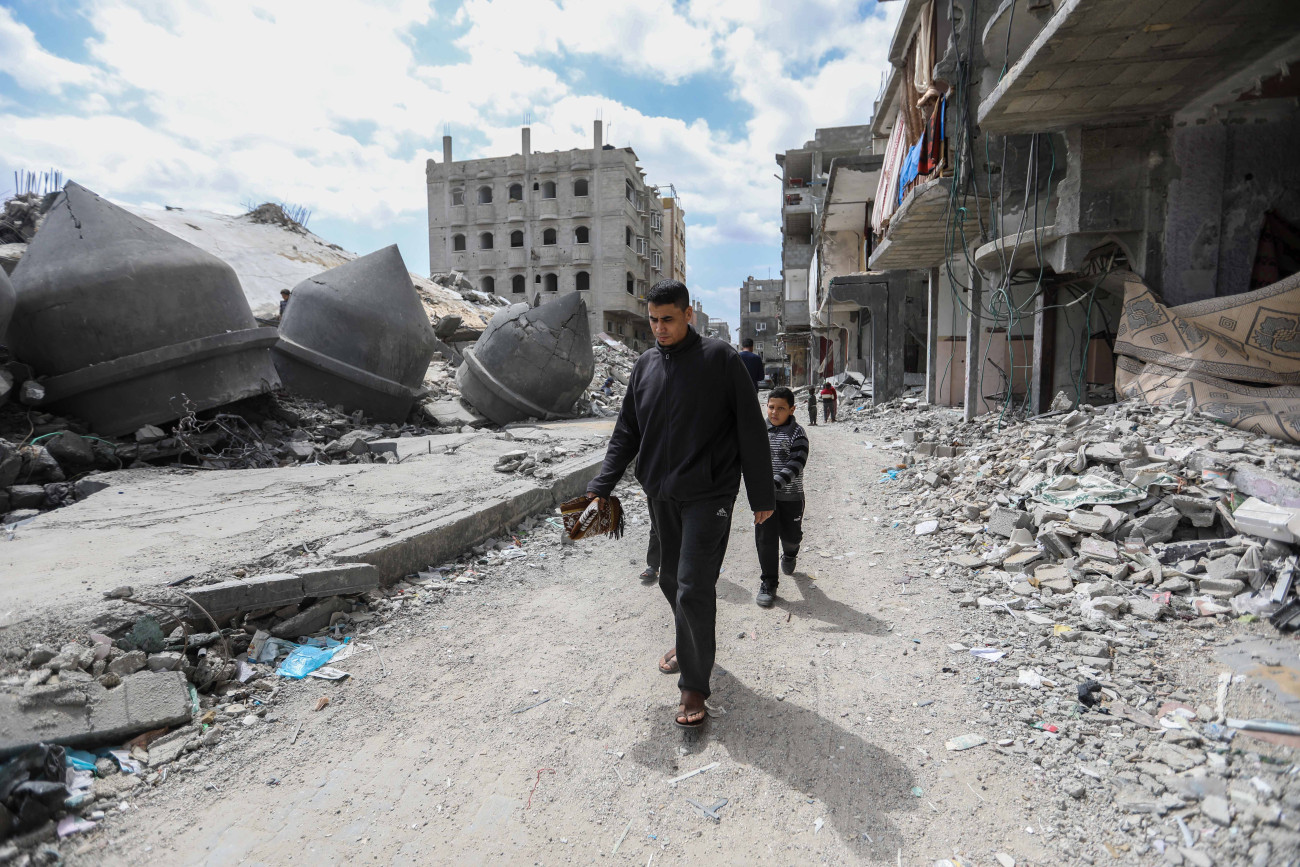

Introduction
Six months since the Oct. 7 Hamas attacks on Israel and subsequent outbreak of war in Gaza, the deadly and devastating conflict looks no closer to concluding, while the threat of regional spillover continues to grow. At the end of March, another international effort at mediating a temporary cease-fire and hostage-prisoner exchange failed, with Hamas refusing the deal and Israel recalling its negotiating team from Qatar. Negotiators hammered out a new draft this week, but it remains to be seen if it will be accepted. Neither side looks ready to concede or scale back its aims.
Is it still possible to engineer a temporary cease-fire as a first step to achieving a sustainable cessation of hostilities and restarting the conflict-resolution process? And to get there, what are the incentives and disincentives that could be constructed for the two main combatants, Israel and Hamas? MEI has asked a group of regional and US experts to weigh in on these and related questions.
Photo by Ahmad Hasaballah/Getty Images
Viewpoints
-
Paul Salem
Paul Salem

The multiple risks of a prolonged war, and the urgency to bring it to an end
The latest violent conflagration to ignite from the decades-long smoldering of the Israeli-Palestinian conflict is entering its sixth month and must be brought to an end as soon as possible. The Oct. 7, 2023, Hamas attack on Israel was the deadliest attack on civilians in Israel’s modern history and the biggest breach of Israeli security since 1973. For Palestinians, the devastating Israeli counterattack has been the largest disaster since the Nakba of 1948 and the Naksa of 1967. The massive Israeli retaliation has greatly degraded Hamas but has only further complicated Israel’s long-term political-strategic dilemma.
For the wider Middle East, the conflict reversed pre-Oct. 7 trends toward regional de-escalation and normalization; spread to or exacerbated conflict in Lebanon, Yemen, the Red Sea, Iraq, and Syria; as well as inflamed public opinion throughout the Arab and Muslim worlds. Iran and its proxies are once again riding the wave of pro-Palestinian, anti-Israeli sentiment, while ISIS, al-Qaeda, and other Sunni radical groups now have powerful new recruitment material for years to come. For the United States, anti-American sentiment is sky high, American military forces in the Middle East are under strain from intermittent attacks, and the US appears dangerously weak to both its partners and opponents, unable to influence its main regional ally, Israel, or to sustainably deter its main regional adversary, Iran and its proxies.
The consequences of the war so far have been devastating enough — both the initial Hamas attack on Israelis and, since then, the unrelenting destruction that has unfolded in Gaza, in addition to the regional repercussions mentioned above. A continuation of the war means tens of thousands more lives lost or broken in Gaza, and the risk that any of the regional conflict patterns could escalate out of control. A continuation also risks escalation along two pathways that have not occurred yet: a) a spillover of naval disruption into the Gulf region, which would drive a spike in energy prices and have global economic repercussions, and/or b) a major incident in or around the al-Aqsa Mosque in Jerusalem, which would redefine this conflict from an Israeli-Palestinian one to one between Israel and the broader Muslim world — with dramatic repercussions.
A continuation of the war will also not bring significant strategic benefits for Israel. Hamas is already greatly degraded; like Hezbollah after 2006, despite its bluster, Hamas will for many years hence not be in a political or military position to drag Gazans into another war with Israel. Also, whether Israel takes Rafah or not, the longer-term strategic dilemma for the Jewish state will largely be the same, while the prospects for safely freeing the rest of the Israeli hostages held in Gaza may further diminish. Hamas as a movement will still exist. It can organize a long-term insurgency if Israel plans to maintain a full occupation of Gaza for the foreseeable future, or it can seek to rearm and regroup over time. The only way forward, therefore, relies on a political path that includes the Palestinian Authority, Arab states, the US, and the international community. All of that will only be made harder if tens of thousands more Palestinians are killed in conflict or extinguished by famine and disease — or if one of the aforementioned regional conflict pathways escalates out of control.
For both Israelis and Palestinians, the rebuilding of arrangements for human security will depend on the vision and diplomacy that begins the day after the fighting ends, not on the remaining battles of the ongoing war. It is urgent for all sides, including regional actors and the US, to bring that day much closer.
Paul Salem is president and CEO of the Middle East Institute. He focuses on issues of political change, transition, and conflict as well as the regional and international relations of the Middle East.
-
Brian Katulis
Brian Katulis

A missing ingredient: Strategic diplomacy by the United States
In response to the Oct. 7 Hamas attack on Israel that sparked this current war, the Biden administration doubled down on its diplomatic engagement in the Middle East. The task of ramping up its focus and attention on the region was a major challenge because the administration had spent much of its first two and a half years in office treading cautiously and placing it lower on its list of foreign policy priorities behind China, Russia’s war against Ukraine, and climate change, among other issues.
The main drivers of events these days in the Middle East are the primary combatants to the war, Israel and Hamas, as well as a number of other actors, particularly those backed by Iran, including the Houthis in Yemen, Hezbollah in Lebanon, and several militias in Iraq and Syria. The Biden administration rapidly understood that “diplomacy first” didn’t mean “diplomacy only,” and it quickly stepped up its military engagement in the region to deter a range of groups that threaten America’s military presence as well as undermine the security of Israel and other regional partners.
The Biden team also intensified its direct diplomatic engagement on several fronts, but to date this diplomacy has mostly centered on crisis response and management. It appointed a special envoy on humanitarian issues and sent several top national security officials on successive trips to engage directly on cease-fire talks and hostage negotiations that have now gone on for four months since a temporary halt to the fighting collapsed in early December. US Secretary of State Antony Blinken made six trips to the region from October of last year until March of this year, and there’s little doubt America’s top diplomat will be going back again soon.
In America’s current debate about how to end the war in Gaza, much of the discussion revolves around ways to use leverage to shape Israel’s military campaign to eliminate the threat posed by Hamas. The center of gravity in this debate in recent weeks has shifted toward more assertive leverage of hard power tools, such as cutting weapons aid to Israel. The main problem with this focus is that it fails to explain how the US can do that but still achieve its original stated goals, including eliminating the threat posed by Hamas, gaining a release of hostages that include US citizens, reducing the threat of a regional war, and advancing toward a two-state solution. America’s discussion about the Gaza war is stuck in the tactical weeds, a reflection of how the current policy is being implemented.
To build a bridge between another possible temporary cease-fire and wider regional diplomacy, the Biden administration needs to engage in strategic, proactive diplomacy that has been absent from the stepped-up engagement since October.
The missing piece in this equation is the creation of a regional contact group, one that would coordinate actions on addressing both short-term issues such as the humanitarian crisis as well as setting a longer-term framework for regional collective action on post-conflict reconstruction, creating a pathway toward a two-state solution, and undertaking tangible steps to achieve broader regional integration. Indeed, forward momentum on some key pre-Oct. 7 diplomatic efforts, such as a possible Saudi-Israeli normalization accord and ideas like the India-Middle East-Europe Economic Corridor (IMEC), announced at last year’s G20 summit, may all help promote and sustain an enduring Israeli-Palestinian settlement.
This regional contact group could include a select group of US partners that are already engaged in a range of important diplomatic efforts — though so far in a largely ad hoc manner that lacks holistic structure. In addition to Arab partners such as Egypt, Jordan, the Palestinian Authority, and key Gulf countries, interested European and Asian states could also be involved. Critically, the Biden administration should appoint a special envoy based at the State Department to spearhead the group’s activities. Similar to the coalition the United States created with partners in the region and around the world in response to the rise of the Islamic State in 2014, this regional coalition would focus on coordinating collective action along key lines of effort related to the immediate conflict and strategic planning for the post-conflict situation.
But success in such an endeavor will require deeper US engagement in the Middle East, rather than pulling back in a restrained or offshore-balancing approach, and it will also necessitate a longer-term focus than is typically imagined during an election year in the United States.
Brian Katulis is a Senior Fellow for US Foreign Policy and Senior Advisor to the President at the Middle East Institute.
-
Nimrod Goren
Nimrod Goren

Israel needs enhanced security and new leadership to move toward peace
The international community is seeking a quick way out of the war in Gaza. A growing number of countries are calling for an immediate and permanent cease-fire, as well as for steps that will de facto create a two-state reality.
Those in Israel seeking peace with the Palestinians would have also desired rapid progress toward an end to the conflict. But the situation on the ground and the current modalities of international conduct point in a different direction.
Transitioning from war to peacemaking will require a long and winding road, necessitating gradualism, political changes, and skilled diplomacy. From an Israeli perspective, such a road will first have to pass through enhanced security — a long-standing central need for Israeli society that has become even more vital after Oct. 7 — and then through the ballot box.
The starting point should be a successful outcome of ongoing talks about a six-week pause in fighting, enabling the release of Israeli hostages. This could reverse current escalatory conflict trends and open new diplomatic opportunities. Without it, a more negative trajectory of events may occur in Gaza and along the Israel-Lebanon border, especially given a possible Iranian retaliation for Israel's recent strike in Damascus. US diplomacy is invested in advancing such a cease-fire arrangement but has not delivered yet. This should be the top priority.
A pause in fighting in Gaza is a prerequisite for advancing the diplomatic formula devised by US special envoy Amos Hochstein to diffuse escalation between Israel and Hezbollah. This formula is the most promising option for enabling tens of thousands of evacuated Israelis to return to their homes in the north as well as prevent further Israel-Hezbollah escalation.
A pause will also buy time for Israel and the United States to find common ground on how an Israeli victory over Hamas — an objective that the US supports — could be achieved and what it would actually look like. The two countries currently differ on this point. The US is concerned by the potential impact of a major Israeli ground operation in southern Gaza, while Israeli Prime Minister Benjamin Netanyahu views it as a necessary step in eliminating Hamas’ power and moving toward the rehabilitation of communities adjacent to the Gaza Strip.
Israelis seek reassurances that the US is mindful of their security needs and committed to provide continued military support to operations in Gaza. But the level of US support is dependent on how Israel treats the humanitarian issue. The sea corridor from Cyprus to Gaza and the setting up of the US pier, both acceptable for Israel, can be positive developments in this regard, producing a win-win outcome. For this to work, after the bombing of the World Central Kitchen’s convoy, Israel should do more to ensure the safety of aid workers.
Most Israelis do not see an alternative to some sort of continued military presence in the Gaza Strip as a means to ensure security. The immediate preference is for the Israel Defense Forces to remain in Gaza, while in the longer term this could be replaced by a peacekeeping force led by trustworthy countries. In parallel, there is a desire for increased international involvement in the civilian management of the Gaza Strip. The majority of Israelis also do not grasp the necessity of enabling a reformed Palestinian Authority to take control of the Gaza Strip; the US could and should assist in this.
To leverage an Israeli sense of enhanced security to make progress toward peace, a new Israeli leadership will be required. The current coalition — with its hawkish ideology and far-right members — seeks long-term military control in Gaza and is blocking prospects for a two-state solution. Most Israelis already want early elections and are increasingly taking to the streets to advance them. Calls for early elections are also increasingly being heard within the political system.
Such elections could — according to recent polls — lead to a more pragmatic and moderate government, resembling the ideologically diverse Bennett-Lapid coalition, which ruled in 2021-22. Such a government is expected to, once again, be welcome in the region and by the West, enabling renewed diplomatic engagement. In such a scenario, the US should ensure that steps related to regional cooperation and further normalization are linked with progress toward a two-state solution.
However, the level of Israeli public support for a two-state solution has dropped significantly since Oct. 7. Transforming this reality will take time, and the US can contribute by supporting positive interactions between Israelis and Palestinians, at the civil society, business, and political levels. It can also help restore Israel’s existing relations with Arab and Muslim countries, once geopolitical conditions improve.
International actors are already feeding the Israeli debate on early elections with their criticism of Netanyahu’s policies. Once elections are called, the US could have a further impact by presenting the Israeli public with a historic offer for a new regional reality — one that includes normalization with Saudi Arabia but requires steps toward the Palestinians that only a different Israeli leadership could take.
Dr. Nimrod Goren is the Senior Fellow for Israeli Affairs at the Middle East Institute, President of Mitvim - The Israeli Institute for Regional Foreign Policies, and Co-Founder of Diplomeds - The Council for Mediterranean Diplomacy.
-
Khaled Elgindy
Khaled Elgindy

For Palestinians, end the carnage in Gaza and address the root causes of the conflict
For Palestinians, ensuring a durable peace has certain essential requirements. The most urgent and pressing priority is for an immediate cease-fire coupled with a massive and sustained influx of humanitarian assistance by land, sea, and air to all parts of Gaza, especially the north. Short of a full cessation of hostilities, the focus should be on securing a temporary cease-fire that could pave the way for a more lasting permanent one, in line with United Nations Security Council Resolution 2728.
Given the Netanyahu government’s pattern of flouting US and international demands over the previous six months along with the strong support for continuing the war within the ruling coalition and among the Israeli public, changing Israeli behavior in Gaza will require a significant shift in the Biden administration’s approach — from mild criticism and coaxing to a greater willingness to call out Israeli violations of international and US law publicly and explicitly. It will also require a willingness to employ serious leverage, such as potentially withholding further military assistance until Israel complies with its obligations under international law, including the provisional measures laid out by the International Court of Justice (ICJ). This should be followed by the convening of an international donor conference focused on Gaza’s medium- and long-term reconstruction needs, which are likely to run in the hundreds of billions of dollars. Those countries that have helped to finance and otherwise facilitate Israel’s destruction of Gaza should bear a greater share of the financial burden commensurate with their role.
No less urgent is the need for Palestinians to put their political house in order. In addition to ending the debilitating and destabilizing schism between Hamas and Fatah, Palestinian political factions and civil society representatives should work to establish a cohesive and unitary political leadership that has both the legitimacy and the capacity to a) oversee Gaza’s reconstruction and rehabilitation and b) effectively represent the needs and aspirations of the Palestinian people in the international arena, including any future diplomatic process. This could come in the form of a reformed, expanded, and revitalized Palestine Liberation Organization (PLO).
At the diplomatic level, the focus should be on altering the dynamics that animate and fuel violence on the ground. Thus, instead of arming and facilitating the ongoing carnage in Gaza, responsible third-party actors should make clear that there is no military solution to the conflict. Likewise, instead of pushing for a new round of most likely futile negotiations, the United States, European Union, Arab countries, and other international stakeholders should call for and commit to ending Israel’s 56-year occupation of the West Bank, East Jerusalem, and Gaza Strip, including a clear timetable and benchmarks, as well as a comprehensive freeze on Israeli settlements in the West Bank and East Jerusalem.
Finally, given the unprecedented collective trauma on both sides as well as the sheer scale of death and destruction in Gaza, there is a need for accountability, which is critical for mitigating future conflict as well as overcoming (at least partially) the massive power asymmetry that currently exists between Israelis and Palestinians. In the short term, the international community should support the ICJ’s deliberations into Israeli violations of the genocide convention, as well as the ongoing investigation by the International Criminal Court (ICC) into possible war crimes and other violations of international humanitarian law by both sides. Moreover, the US and other international stakeholders should look seriously at models of transitional or restorative justice, for example through the creation of a truth and reconciliation commission, as a way to address past grievances, including the long-neglected refugee problem, and promote genuine reconciliation in a conflict that, despite being more than a century old, continues to inflict widespread suffering today.
Khaled Elgindy is a senior fellow at the Middle East Institute and the director of its Program on Palestine and Israeli-Palestinian Affairs. He is the author of the 2019 book, Blind Spot: America and the Palestinians, from Balfour to Trump.
-
Mirette F. Mabrouk
Mirette F. Mabrouk

Cease-fire negotiations in Cairo hobbled by unrealistic aims and bad faith
Various iterations of the same headline have been running for months: Either a Hamas or an Israeli negotiating team has left Cairo to mull over a new proposal. The latest concerns the Israeli delegation that left Cairo on April 2. A brief statement from the Israeli Prime Minister’s Office, issued on behalf of the Mossad, notes, “During the negotiations, with the effective mediation of Egypt, the mediators put together an updated proposal for Hamas to address,” thereby lobbing the ball back into Hamas’ court. The statement also took an apparent swipe at Qatar, which has been mediating, along with Egypt, saying that the Israelis expected “the mediators to act more forcefully against Hamas” to move the negotiations forward. Possibly not so coincidentally, Qatari Prime Minister Mohammed Al Thani on Wednesday said the “fate of the region cannot be left in the hands of politicians willing to endanger it for their personal benefit,” a presumably a none-too-subtle reference to Israeli Prime Minister Benjamin Netanyahu.
Despite the best efforts of Egypt, Qatar, and other negotiators, including the United States, the sputtering progress (or lack thereof) and acrimony have been a hallmark of the negotiations over a conflict that has so far claimed 1,200 Israeli lives and at least 33,000 Palestinian ones, the majority of whom have been children and women. The comment on Egypt’s “effective” mediation efforts may well be taken at face value, but they may also be an attempt by Israel to tamp down spiraling tensions between itself and a neighbor it has had close security and military ties with for almost half a century. Israel’s early insistence that Palestinians flee to Egypt was retracted in the face of an immediate Egyptian rebuttal; yet the Israeli operation has crammed over a million Palestinians in the Gaza Strip up against the border, with nowhere left to flee but Egypt’s Sinai Peninsula in case of an invasion of Rafah. That, coupled with overwhelming public empathy in Egypt for the Palestinians heightens the stakes for the Egyptian mediation team’s efforts.
Successful mediation, however, requires willing partners, the right incentives to place on the table, and a mutually agreeable conclusion. All three criteria are questionable under the current circumstances. Egyptian negotiators are keenly aware that while the plight of the Palestinians might have bought Hamas some sympathy outside Gaza, it’s a very different story inside the embattled enclave. There, despair over the death and destruction wrought by Israel’s unrelenting bombardment has whittled down any possibility of the group’s political future in the strip, complicating negotiations.
The situation is made even more difficult by the fact that the obvious replacement for governing Gaza would be a revamped Palestinian Authority (PA), but Netanyahu has unequivocally stated that Israel would oppose PA governance in Gaza, without offering any alternatives. The stance isn’t particularly surprising considering that he spent the last 14 years propping up Hamas in Gaza to weaken the PA, thereby negating the possibility of any real, united Palestinian partner. Egyptian negotiators have said privately that they have spent time convincing the PA leadership of the need for change if it is ever to rule, and have seen progress. That progress, however, is of little value if Palestinians are not allowed a seat at the table. Israeli negotiators have said that they prioritize defeating Hamas and the safe return of the remaining hostages. However, bombastic rhetoric aside, the probability of entirely annihilating Hamas is extremely dim, and there is a very real possibility that this conflict could drag on for an unspecified duration, in a terrible “new normal,” potentially escalating into a wider regional conflict. Negotiators are also worried that the Israeli position may not be unified: It’s no secret that there appear to be trust issues between Netanyahu and various members of the security and defense forces nor that there is widespread domestic condemnation of Netanyahu’s government.
Matters are also complicated by the fact that Israel’s prime minister has said he wants open-ended control over security and civilian affairs over the strip after the conflict — a proposal immediately rejected by Palestinian leaders. He’s also demanded control over the Philadelphi Corridor, the 14-kilometer buffer zone between Egypt and Gaza, a move Egypt has flatly said is in violation of the 1979 bilateral peace agreement.
Last month, Egyptian negotiators put together a draft for a potential way forward, which was shared with and approved by Jordanian and PA representatives, before being distributed to Saudi, Emirati, and Qatari representatives. A final draft deal should be ready imminently. Ultimately, negotiators hope that the ebbing of public good will for both combatants, caused by the carnage, may usher in more compromising attitudes. The immediate aim is for a cease-fire to staunch the bloodshed in Gaza and ensure the return of the hostages. The biggest impediment to success in the negotiations, however, may be having to rely on the good faith of, on the one side, a group that realizes it may have overreached and, on the other, a political party that in part sees the conflict as a God-given opportunity to finalize a colonization.
Mirette F. Mabrouk is an MEI Senior Fellow and Director of the Institute’s Egypt and Horn of Africa Program.
-
Gerald M. Feierstein
Gerald M. Feierstein

Gaza and the Gulf: Essential partners
As the Biden administration scrambles to organize a “day after” plan for what could follow the end to the Israeli military operations in Gaza, one persistent expectation is that the Gulf states — especially Saudi Arabia and the United Arab Emirates, but possibly also Kuwait and Qatar — will play a significant role politically and financially. Israeli Prime Minister Benjamin Netanyahu’s government, too, expects that the wealthy Gulf states will at least finance Gaza reconstruction. In December 2023, the Times of Israel reported that Netanyahu told a Knesset Foreign Affairs Committee meeting that “the United Arab Emirates and Saudi Arabia will support the rehabilitation of the [Gaza] Strip.” It was unclear from the report on what basis Israel’s head of government made that assertion.
The Oct. 7 Hamas terrorist attack and the Israeli military response have confounded and slowed Gulf engagement with Israel as well as firmly reversed any historical progress toward resolving the Israeli-Palestinian conflict. Nevertheless, the Gulf states had repeatedly demonstrated over the past two decades that they are prepared to move beyond their traditional policies of rejecting Israeli-Arab normalization outright. Beginning with the late King Abdullah’s Arab Peace Initiative in 2002, Saudi Arabia has laid out basic principles for normalization with Israel that rested on the resolution of the Israeli-Palestinian conflict and establishment of a sovereign, independent Palestinian state. Those principles also form the basis for the Biden administration’s own vision for the Gaza day after. Similarly, UAE ambassador to Washington Yousef al-Otaiba, one of the architects of the Abraham Accords, has been clear that advancing Israeli-Palestinian peace was one of the core objectives of the Emirate’s normalization decision.
But the Gaza war has added additional complications to the prospects for further Gulf engagement. Although the Gulf states have expressed a willingness to join international efforts to rebuild Gaza, assist with governance and security there, and support new diplomatic initiatives to end the Israeli-Palestinian conflict, the overwhelmingly negative popular reaction in the Arab world to Israel’s military operations have left Gulf leaders wary of any measures that could be perceived as support for Israeli policies. Thus, the vision that the Netanyahu government has laid out for post-conflict Gaza, including an enduring Israeli military presence, the potential for new Israeli settlements, no role for the Palestinian Authority or legitimate Palestinian political or security engagement, and no credible process to resolve the fundamental Israeli-Palestinian conflict, would pose insurmountable obstacles for a significant Gulf role.
To ensure that the Gulf states bring their political and financial resources to bear in the period following the end to Israeli military operations, the Biden administration will have to overcome Israeli obstacles and objections. Additionally, the US side must demand a) an end to Israel’s military presence in Gaza, b) a complete restoration of Palestinian control over 100% of Gaza’s territory, c) the return of the Palestinian Authority to play its role in governance and security there, and d) a meaningful path forward for a political process to end the conflict and produce an independent Palestinian state. For an administration thus far unwilling to challenge the Israeli government, rhetoric aside, this will require a fundamental sea change in its approach.
Amb. (ret.) Gerald Feierstein is a Distinguished Senior Fellow on US diplomacy at the Middle East Institute (MEI) and Director of its Arabian Peninsula Affairs Program.
-
Dima M. Toukan
Dima M. Toukan

It’s time for Jordan to up the ante
Israel’s continuing onslaught on Gaza has reverberated across Jordan, spurring large protests that have only intensified over time. Sparked by a visceral national opposition to Israel’s war in Gaza, Jordanians are grappling with a collective crisis that runs deep in the national psyche. Witnessing the rising death toll and the failure of ongoing regional and international diplomatic efforts to secure Palestinians any respite has taken a toll on the population and its leadership. With a strong tribal connection, over 2 million Palestinian refugees, and a majority of Jordanians of Palestinian descent, it is not difficult to understand why. King Abdullah is doing what he does best, exerting enough diplomatic effort to mitigate risks, primarily to Jordan. He carefully straddles the divide between a seething internal front and a seemingly one-sided international stage in an effort to prevent the crisis from metastasizing into a larger regional conflict and/or destabilizing the country.
Jordan’s position has been clear from the start. It has condemned Israel’s military campaign against Gaza and declared the occupation of Palestinian territories as the origin of the crisis. Early on, Jordan recalled its envoy to Israel and demanded the Israeli ambassador leave Jordan. The country has vehemently rejected any plans by Israel to occupy parts of Gaza or to create security zones within the enclave. Jordan’s foreign minister has also refused involvement in a post-war Gaza, including calls for the deployment of Arab forces to manage the strip. The country’s response has been to issue strongly worded statements, conduct multiple rounds of shuttle diplomacy, and propose a United Nations General Assembly resolution that called for an immediate and sustained humanitarian truce. Jordan also supported the case against Israel at the International Court of Justice. Project Prosperity, the energy and water deal that would have seen Israel receive solar energy in exchange for Jordan getting desalinated water, was canceled in November.
While its role in regional politics was reduced somewhat after the signing of the Abraham Accords, the war in Gaza has hurled Jordan back to the center. To secure its interests, Amman must now punch above its weight. Jordan’s trump card lies in leveraging the existential risks to its stability. The January drone attack on US troops stationed on Jordanian soil highlighted its important role as a buffer against the Islamic State and Iran-backed militias. Today, the war on Gaza is providing fodder inside Jordan for the Muslim Brotherhood and its local political arm, the Islamic Action Front, as well as increasing the resonance of Hamas. Recently, Hamas leaders have called upon Jordanians to take to the streets and to end the 1994 peace treaty with Israel. With public opinion already soured over Amman’s official stance, these calls have had a galvanizing effect on Jordanians, resulting in increasingly heated slogans.
From the US’s perspective, Jordan’s security ties with both the United States and Israel are central to maintaining the region’s increasingly tenuous stability. Jordan has already raised the stakes by declaring any attempt to displace Palestinians would be a “declaration of war.” It is now time for Jordan to up the ante and drive home the message that the new security reality Israel is seeking — the total defeat of Hamas — is unattainable and could have a catastrophic price regionally. With two active fronts, Israel cannot afford an annulment of its treaty with Jordan under internal pressure, or a destabilized neighbor exporting extremism along its 300-mile border. The longer Israel’s war in Gaza drags on, the more realistic these eventualities will become.
Dima Toukan is a Non-Resident Scholar at MEI and the Founder and Managing Partner of Integrated International, a development consulting firm based in Jordan.
-
Alex Vatanka
Alex Vatanka

Two realities shape Iran’s stance on the Gaza war and the Israeli-Palestinian conflict
Iran is a key stakeholder in the Israeli-Palestinian conflict. Tehran does not have a deciding vote on the outcome of the current war in Gaza, but it does have plenty of capacity to shape the future course of the conflict. Iran is, after all, among the top backers of Hamas, both in terms of diplomatic support and as a supplier of military materiel and knowhow.
There are two basic realities when it comes to understanding Tehran’s likely stance on a possible political process to end the conflict. First, the Islamic Republic’s rejection of Israel has been a core ideological pillar since 1979 and this is unlikely to change unless — and even then, only perhaps — there is a dramatic shift in Israeli-Palestinian relations for the better. Second, Iran’s current regional agenda, carried out via a network of pro-Iran Arab militant proxies, requires a common foe, and armed opposition to Israel serves that purpose.
For these two conditions to change, there needs to be a fundamental rethink in Tehran of what constitutes Iran’s key national interests, and that is highly unlikely as long as Supreme Leader Ayatollah Ali Khamenei and the first-generation senior commanders of the Revolutionary Guards are calling the shots. Still, it would be hard for Iran to maintain its rejectionist stance toward Israel if the rest of the Muslim world were able to engage the Jewish state in a meaningful political negotiation process that could lead to a two-state solution as a conclusion to the Israeli-Palestinian conflict.
As a point of departure, the depth of the Islamic Republic’s antipathy toward Israel has to be noted. When Islamists took over Tehran in 1979, the first foreign visitor was the head of the Palestine Liberation Organization (PLO), Yasser Arafat. He traveled to Tehran to meet the new Iranian leaders and strategize how to force Israel to meet Palestinian demands for a nation-state. But he quickly fell out with Ayatollah Ruhollah Khomeini once it became apparent that they faced an insurmountable disagreement over objectives.
The secular-nationalist PLO aimed to achieve a Palestinian state as its primary goal; Khomeini, by contrast, wanted the end of Israel under the banner of a pan-Islamic campaign led by Iran. He famously dismissed Arafat as a “traitor and idiot,” a remarkably prejudiced comment given that Khomeini had not once set foot on Palestinian soil. But then again, for Khomeini, the Palestinian question was much bigger than the plight of the Palestinian people.
Khomeini’s successor, Ayatollah Khamenei, remains faithful to that same pan-Islamic campaign. To be sure, over the last 45 years, Iran was not able to derail Israeli-Arab dialogue when it happened: It could not undermine the Camp David Accords (1978) or stop the Oslo Accords (1993, 1995), the Israel-Jordan peace deal (1994), or the Abraham Accords (2020). Most recently, Khamenei’s repeated calls since Oct. 7 for a comprehensive Islamic boycott of Israel has been more or less entirely ignored. The Islamic Republic’s categorical rejection of Israel’s right to exist is obviously seen by other regional states as a recipe for endless war.
Instead, Iran has had a far greater impact by acting as a supplier of weaponry during periods of Israeli-Palestinian armed conflict, when there is no prospect for a political process. Hamas, Palestinian Islamic Jihad, and other Arab movements like Hezbollah and the Houthis all owe their military prowess and capabilities to Iran.
And yet, just as Khomeini could not dictate to Arafat, Khamenei cannot dictate to Hamas, an organization that certainly does not consider Tehran its master but rather a useful source of assistance when few are willing to come to its aid. The bottom line is this: Iran and Hamas part ways on a fundamental question. Hamas has come to accept Israel as a reality and is willing to negotiate with it for a deal to end the Gaza war. Khamenei and the generals in the Revolutionary Guards at the core of the Axis of Resistance, who uphold Israel as the ultimate nemesis, have yet to come to this same acceptance.
Could Khamenei be incentivized to change course? In his 35 years as Iran’s ultimate leader, Khamenei has not once even hinted at what it would take for Iran to recognize Israel as a member of the United Nations and a reality of the Middle East. Therefore, as long as he is still alive, Tehran will stick to its policy of “strategic patience” and try to bleed Israel as much as possible but seek to avoid open war, as that, in Tehran’s eyes, would invariably mean fighting the Americans.
Until the Iranian leadership begins to see its rivalry with Israel as a geopolitical contest that can be settled and not as a sacrosanct religious mission, then Tehran cannot realistically be part of any Israeli-Palestinian political process. And whether it can be a spoiler in such a process very much depends on the strength of the Israeli and Palestinian/Arab commitment to a two-state solution.
Alex Vatanka is the director of the Iran Program at the Middle East Institute and a Senior Fellow with MEI’s Black Sea Program.











